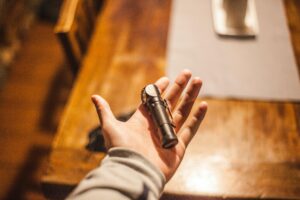Whether you are renting a home for a vacation or renting a home as a residence, you need to be concerned about hidden cameras that the landlord or property manager may have installed without your knowledge or consent.
The following was a story covered by 11Alive asking everyday people if they can spot the hidden cameras in a room even when they were told they were there:
https://www.youtube.com/watch?v=L2OzzUnqEzU

According to a survey from Investment Property Exchange (IPX 1031), more than 1 in 3 people have searched a vacation property looking for cameras and 1 in 4 have found one.
https://www.ipx1031.com/vacation-rental-property-practices-data-2023/
Every day there is yet another case about hidden cameras that are often found by accident and typically long after the devices were installed. There have even been attempts by the perpetrators to extort the victims with the illegally obtained audio/video.
Extortion Example #1:
Airbnb owner captures a guest having an affair and tries to extort payment to prevent the owner from sending the video to the guest’s spouse.
https://www.the-sun.com/news/10387203/airbnb-owner-revenge-on-guest/#:~:text=AN
Extortion Example #2:
A man renting a house to a woman captures hidden video of the woman in undress and attempts to extort her by posting the videos online if she does not consent to having sex with him.
https://www.woodtv.com/news/kent-county/landlord-confesses-to-hidden-camera-extortion/
Georgia Law:
The state of Georgia does have a law that makes it illegal to secretly photograph someone in “any private place out of public view”; however, it does explicitly allow homeowners to install cameras at rental property for security purposes.
Interior or common area cameras installed by the homeowner can be a gray area. Most, if not all consumer grade security cameras also have audio capabilities which opens an entirely new level of concern. Recording a conversation that you are not a party to is a violation of most state laws. And yet these cameras with audio are ubiquitous.
In Georgia, unlawful surveillance is a felony punishable by one to five years in prison, and/or a fine of up to $10,000.00.
Tips to Consider:
Below are a few tips to consider when renting a property:
Tip #1 – Read the fine print. 
The first thing to do is to review the contract of the home you are renting. The contract may tell you that there are cameras and where to find them. If you are unsure, ask the homeowner.
Tip #2 – Use a flashlight or lens finder. 
Walk the house. Look over anything that is plugged into an outlet, especially in bathrooms and bedrooms. Examine all outlets, especially the ones that are not used. Typically, the ground port for an electrical outlet outfitted with a hidden camera will be unusable because the lens is inside it. With a camera or a lens finder you should easily see a camera in an outlet.
If there are devices plugged in like alarm clocks and radios and you are unsure of their capabilities, simply unplug them and store them in a closet or somewhere out of the way until your stay is over.
Examine all smoke detectors and carbon monoxide detectors for a lens. If there is a lens on one of these devices it will be observable upon close inspection.
If there are battery powered clocks, battery powered picture frames or anything you are unsure of you can just put them in a closet, drawer or somewhere out of sight until your stay is over.
Heating and air vents can also be locations where a camera might be hidden. Use a flashlight or lens finder to examine.
Check lightbulbs too. Yes, some new lightbulbs are equipped with cameras. Or there are cameras that fit into lightbulb sockets; however, they are easily detectible when observed closely.
Tip #3 – Use your smart device.
 Look over the Wi-Fi and Bluetooth connections available on your smart device. You may see devices listed such as Arlo, Nest, Wyze, Ring and other known providers of security cameras. If the rental does not list any cameras you may need to determine where these cameras are.
Look over the Wi-Fi and Bluetooth connections available on your smart device. You may see devices listed such as Arlo, Nest, Wyze, Ring and other known providers of security cameras. If the rental does not list any cameras you may need to determine where these cameras are.
They may be outside, or they may be a neighbor if they are close by. Some of these mainstream security cameras are small enough to be hidden inside everyday objects.
Taking a picture of an unknown device using Google Image search might tip you off whether or not a device is non-threatening. It’s a surprisingly useful tool for identifying unknown objects.
There are also free Wi-Fi network analyzers, Bluetooth finders and other applications that can examine the radio frequency environment or networks to determine if anything is either paired to the home’s Wi-Fi or running independently.
Tip #4 – Don’t use the Wi-Fi. 
Using free Wi-Fi that is not your own is always risky, especially at hotels, airports and cafes. It is always advised to use your own Wi-Fi hotspot. It may be that the Wi-Fi at the rental is monitored by the property manager/homeowner and your private information may be observed without your consent or knowledge.
Airbnb has no policy about the monitoring of Wi-Fi at a rental property. VRBO explicitly forbids the monitoring of Wi-Fi. It may be a good idea to use free app on the available Wi-Fi to determine if there are cameras attached to the network, but it is advised not to use someone else’s Wi-Fi for anything else due to the risk of exposing your private data.
While these tips will help you feel more at ease in a rental property, there is no substitute for a professional examination conducted by a TSCM expert. Call Hawk PI today (800) 499-4295 to schedule your sweep.
Next Week Part III – Most vacation rental companies have their own policies in place to protect your privacy. The most current policies for Airbnb and VRBO will be discussed on the next blog.